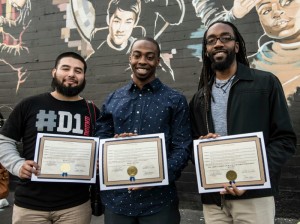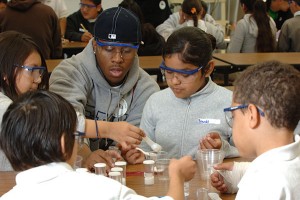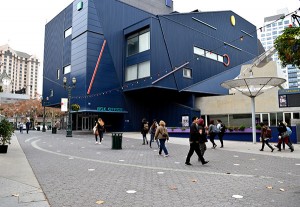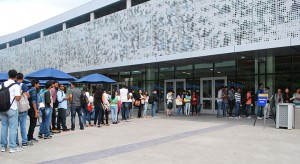
SJSU students Randy Vazquez, Danny McLane and staff member Jahmal Williams pose with their community service certificates presented by the city of San Jose. Photo by Associate Professor of Journalism and Mass Communications Michael Cheers.
Danny McLane, ’16 Industrial and Systems Engineering, has some simple advice for students who are new to San Jose State’s campus: Have a group of people to whom you can talk.
McLane came to San Jose State as a freshman from Richmond as the first in his family to attend college.
“As a first-generation college student, it was a culture shock,” he said. “I didn’t know what to do. When I first got here, I only knew some people from freshmen orientation. I was alone and didn’t know anyone.”
During his second semester, he joined the Phi Beta Sigma fraternity.
“It opened things up for me and I began to connect,” he said. “I was put in a leadership position and I know a lot of people now. It gave me mentors.”
McLane is helping other students find the connections that will make them successful through his work as an intern with the SJSU African-American Student Success Task Force.
He is one of three Spartans who were recognized by the San Jose City Council Dec. 2 for their work in connecting underrepresented minority students to the community – on and off campus.
Students McLane and Randy Vasquez, ’15 Photojournalism, and SJSU staff member Jahmal Williams, received the award for their work at Barbers, Inc., a downtown barbershop where they helped with a multicultural mural that was unveiled on Dec. 2. The mural displays the stylists from the shop cutting the hair of cultural icons such as Carlos Santana, Maya Angelou, Muhammad Ali, Johnny Cash, Bruce Lee, among others.
McLane and Williams are actively involved in SJSU African-American Student Success Task Force, while Vasquez is involved in the SJSU Chican@/Latin@ Student Success Task Force. Along with other members of the task forces, they have created Barbershop Talks, a series for black men and other minority men on campus to share their experiences.
“Those talks are very vital to a lot of students,” McLane said. “It’s not just for African American or Latinos, but for any minority students. It’s a space for those students to feel free.”
He said he has heard from other students that they struggle to feel connected to campus.
“They say they don’t see people who look like them,” he said. “This is an opportunity to connect with other people who look like them, are like-minded and it also adds a community. I see these students who participate and when I see them on campus, I think, ‘hey, that’s my friend.’”
Williams said because black students are such a small population on campus, it’s easy to overlook them and their experience.
“We’ve done a really good job of connecting black students to each other, resources on campus and connecting them to a larger SJSU community,” Williams said. “It’s a place, a city, where they can thrive and feel like they have a purpose. They have staff and faculty who do care about their experience, academics and in life.”


